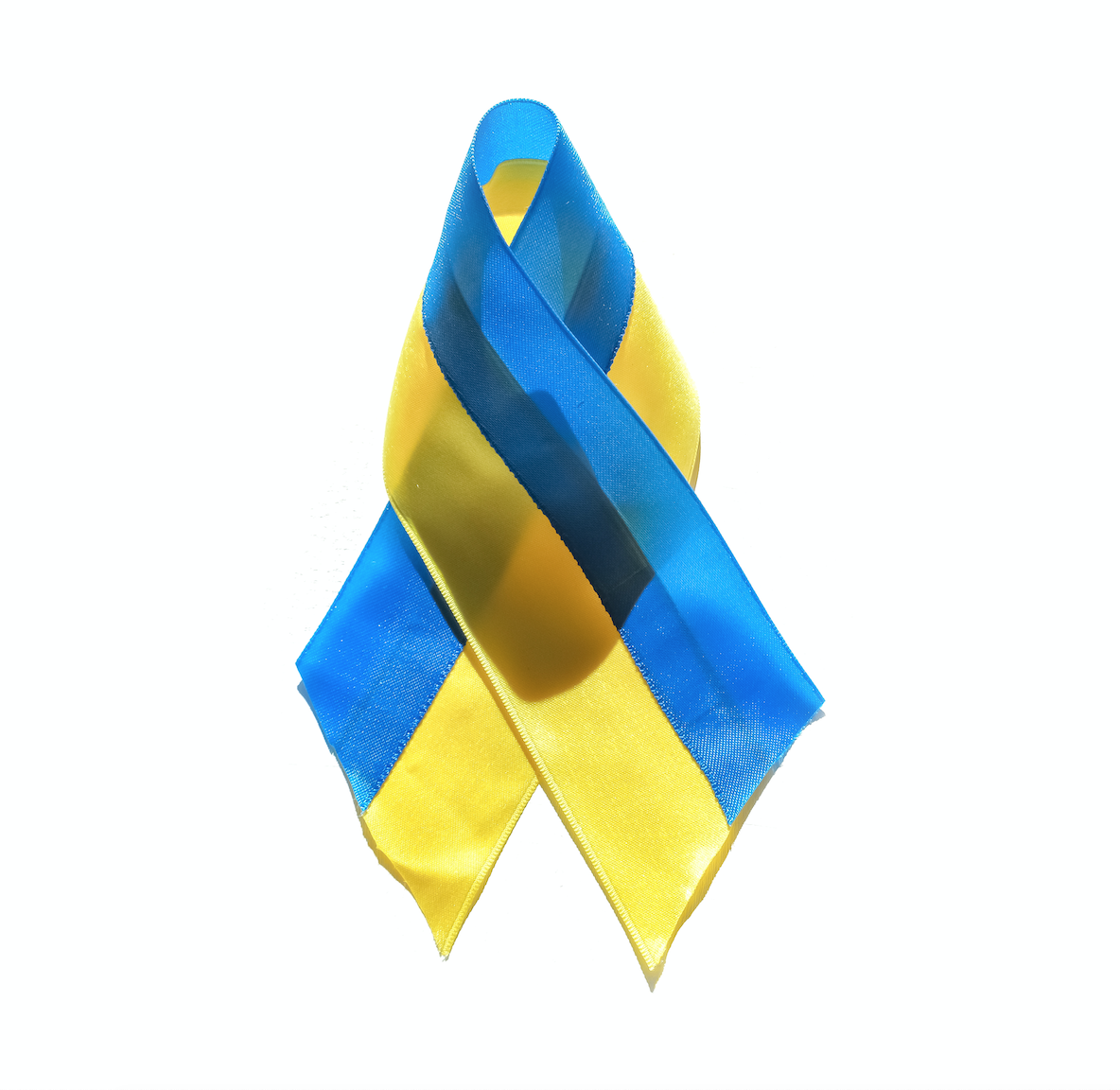
by Mark | Dec 11, 2025 | Global Web News, Web Pro News
The web is global, and so is the regulatory landscape that governs it. For web professionals serving international clients or working for organizations with a global footprint, understanding legislative developments around the world is essential to staying compliant and competitive.
This month, we’re taking a look at significant legislative and policy updates from around the globe that affect how we build, design, and deploy web experiences. From Australia’s groundbreaking under-16 social media ban to evolving AI regulations across Europe, whether you’re developing e-commerce sites for European customers, building applications for the Asia-Pacific market, or creating accessible experiences for users worldwide, these developments deserve your attention.
Europe
European Union: AI Act Implementation and the Digital Omnibus
The European Union continues to lead global technology regulation, and 2025 has been a pivotal year for implementation. The EU AI Act, which entered into force in August 2024, is now in active deployment. As of February 2025, the prohibitions on unacceptable-risk AI practices took effect, banning things like untargeted facial recognition database scraping, emotion recognition in workplaces and schools, and real-time biometric identification in public spaces.
In a significant development last month, the European Commission unveiled its “Digital Omnibus” proposal on November 19, 2025, aimed at simplifying the EU’s sweeping digital regulations. The proposal includes extending the timeline for full AI Act compliance for high-risk systems from August 2026 to December 2027, giving businesses more time to prepare. The Commission estimates these simplifications could save businesses approximately 5 billion euros annually.
However, the Digital Omnibus faces opposition. The proposed changes require modifications to the General Data Protection Regulation (GDPR), and many Members of the European Parliament have already announced their opposition to weakening data protection standards.
The Digital Services Act (DSA) continues its enforcement phase, with Very Large Online Platforms (VLOPs) and Very Large Online Search Engines (VLOSEs)—those with more than 45 million monthly active users in the EU—subject to the most stringent requirements, including annual independent third-party audits. Non-compliance can result in penalties of up to 6% of annual worldwide revenue.
For web professionals, the practical impact is significant. If you’re building AI-powered features, you need to understand the risk classification system. If you’re creating platforms that allow user-generated content, you need DSA-compliant content moderation systems. And if you’re handling any personal data of EU residents, GDPR compliance remains paramount.
The European AI Office provides detailed guidance on compliance requirements and implementation timelines.
European Accessibility Act: Now in Effect
The European Accessibility Act (EAA) came into full effect on June 28, 2025, representing one of the most significant accessibility mandates for private-sector websites globally. Unlike previous EU accessibility requirements that focused primarily on public sector websites, the EAA extends to private businesses, including e-commerce platforms, banking services, transportation, and consumer electronics.
The technical standard for compliance is EN 301 549, which currently incorporates WCAG 2.1 and is being updated to include WCAG 2.2. Web professionals building sites for European audiences should be designing to WCAG 2.1 Level AA at minimum, with WCAG 2.2 becoming the benchmark as standards evolve.
Enforcement varies by member state, but penalties for non-compliance can reach up to €1,000,000 depending on the severity of the infraction. Perhaps more importantly, products and services that fail to meet accessibility requirements can be removed from the European market entirely.
This guide from Level Access provides practical steps for achieving EAA compliance.
United Kingdom: Online Safety Act Enters Phase 2
The UK’s Online Safety Act has entered its most consequential phase. As of March 17, 2025, platforms have a legal duty to protect users from illegal content online, and as of July 25, 2025, they must protect children from harmful content including pornography, self-harm content, and eating disorder content.
The requirement that’s generated the most attention is “highly effective age assurance”—platforms can no longer rely on self-declaration of age or simply prohibiting under-18s in their terms of service. Instead, they must implement robust verification methods such as photo-ID matching, credit card checks, facial age estimation, or digital identity services.
Ofcom, the UK’s online safety regulator, has already opened enforcement actions against pornography providers without effective age assurance, file-sharing services lacking child sexual abuse material protections, and smaller services that haven’t completed risk assessments. Penalties can reach up to £18 million or 10% of global turnover, whichever is greater.
The Act has generated controversy, particularly around its implications for encryption. Apple called it a “serious threat” to end-to-end encryption, while Meta stated it would rather have WhatsApp blocked in the UK than weaken encryption standards. Wikipedia’s Wikimedia Foundation launched a judicial review (which it lost in August 2025), arguing the Act’s requirements would compromise its open editing model.
For web professionals building services that UK users can access, the message is clear: understand your obligations under the OSA, conduct required risk assessments, and implement appropriate safety measures. The regulatory guidance runs to over 3,000 pages—compliance requires dedicated attention.
GOV.UK’s Online Safety Act explainer provides an official overview of requirements and timelines.
Asia-Pacific
India: Digital Personal Data Protection Rules 2025
India officially operationalized its first comprehensive data protection regime on November 14, 2025, with the notification of the Digital Personal Data Protection (DPDP) Rules, 2025. These rules give effect to the Digital Personal Data Protection Act, 2023, which was passed by Parliament in August 2023 but waited over two years for implementing regulations.
The framework introduces consent-driven data governance for the first time in India. Companies must now provide clear, plain-language notices explaining what data is being collected, why it’s being processed, how complaints can be raised, and how consent can be withdrawn. Consent must be “free, specific, informed, unconditional and unambiguous.”
For Significant Data Fiduciaries—organizations designated based on the volume and sensitivity of data they process—additional requirements include annual Data Protection Impact Assessments, mandatory audits, and the appointment of a Data Protection Officer based in India.
The rules are being implemented in phases: Data Protection Board provisions take effect immediately, the consent manager framework in 12 months, and broader compliance obligations in 18 months. Cross-border data transfers are generally permitted unless specifically restricted by the government, offering more flexibility than GDPR—though sector-specific localization requirements remain.
Critics have raised concerns about Rule 23, which gives the state broad power to demand personal data from any data fiduciary without user consent for reasons including national security and “any lawful function of the government.” The Internet Freedom Foundation has characterized these access categories as so wide they invite misuse.
For web professionals serving Indian users or working with Indian companies, this represents a significant shift toward formal privacy requirements. Begin mapping your data practices now to ensure compliance within the phased timelines.
India Briefing’s guide to the DPDP Rules 2025 provides detailed compliance information.
Japan: Platform Regulation and Active Cyber Defense
Japan has been actively developing its digital regulatory framework throughout 2025. The Act on Promoting Competition for Specified Smartphone Software, enacted in June 2024, is expected to become fully effective by late 2025 or early 2026. Inspired by the EU’s Digital Markets Act, this law targets designated providers of mobile operating systems, app stores, browsers, and search engines—primarily Apple and Google—with requirements around interoperability, alternative payment systems, and anti-self-preferencing rules.
The Information Distribution Platform Act came into force on April 1, 2025, requiring large social media providers to implement systems for removing illegal or harmful content, including defamation. Meanwhile, Japan’s Act on Improving Transparency and Fairness of Digital Platforms continues to impose annual self-assessment and disclosure requirements on major e-commerce platforms and app stores.
In a major cybersecurity development, Japan passed the Active Cyber Defense Act in May 2025, which will come into effect in 2026. This legislation moves Japan from a “passive” defense posture—relying on firewalls and antivirus measures—to an “active” approach that allows authorities to monitor communications data for threat detection and take counter-measures against cyberattack sources. Critical infrastructure operators will be legally required to inform the government of cyberattacks.
Japan’s Personal Information Protection Commission is also planning amendments to the Act on the Protection of Personal Information (APPI) for 2025 or 2026, with topics including stronger protections for children’s data and enhanced enforcement penalties similar to GDPR.
Japan’s Digital Agency maintains current information on digital legislation and notices.
Australia: World-First Social Media Ban for Under-16s
Australia has become the first country to enforce a nationwide ban on social media access for children under 16, with the law taking effect on December 10, 2025. The Online Safety Amendment (Social Media Minimum Age) Act 2024, passed by Parliament on November 29, 2024, represents the world’s strictest approach to protecting children from online harms.
The legislation targets 10 major platforms: Facebook, Instagram, YouTube, TikTok, Snapchat, Reddit, X, Threads, Kick, and Twitch. The law places sole responsibility on platforms to take “reasonable steps” to prevent under-16s from creating or maintaining accounts, with penalties reaching up to AU$49.5 million (approximately $32 million USD) for systemic failures. Notably, there are no penalties for children or parents who circumvent the restrictions.
Implementation and Age Assurance
More than 1 million social media accounts held by users under 16 are set to be deactivated as platforms implement age assurance measures. These include AI-powered age estimation from video selfies, email verification, and government ID checks—though platforms are prohibited from compelling users to provide government-issued identity documents or demanding digital identification through government systems. Platforms must delete age verification data after use to address privacy concerns.
Several major platforms have already begun compliance efforts. Meta started removing under-16 users from Facebook, Instagram, and Threads on December 4, ahead of the December 10 deadline. Users can reactivate accounts when they turn 16, with their data stored until then or available for download. Even X, which has been vocal in its opposition based on free speech concerns, announced it would comply using a multi-faceted approach including self-attested age, identification documents, account creation date, and email addresses.
Public Support and Controversy
A YouGov poll found that 77% of Australians support the ban, driven largely by parental concerns about the impact of social media on children’s mental health. Prime Minister Anthony Albanese stated the ban aims to “give kids back their childhood and parents their peace of mind”, citing rising suicide and self-harm rates among Gen-Z Australians.
The push for the ban intensified following grassroots campaigns including “Let Them Be Kids,” launched by News Corp alongside parents and child safety advocates, which garnered over 54,000 petition signatures. A government-commissioned national study found that 96% of children ages 10 to 15 use social media, with seven out of 10 exposed to harmful content including misogynistic material, fight videos, and content promoting eating disorders and suicide.
However, the legislation has generated significant criticism. Mental health experts and child welfare advocates worry that banning young children from social media will dangerously isolate many who use these platforms to find support, particularly LGBTQI youth, children in regional communities, and those from marginalized backgrounds. Critics also argue the ban could drive children to less safe parts of the internet or reduce platforms’ incentives to improve online safety.
The bill’s passage was criticized as rushed, with only one day allowed for public submissions despite 15,000 responses received. Technology companies including Google and Meta urged Australia to delay passage, arguing more time was needed to assess potential impacts.
Legal Challenges and Global Impact
The Digital Freedom Project announced in November 2025 it would commence legal action in the High Court of Australia, arguing the laws violate the implied right to political communication. Implementation challenges are already emerging, with reports of young users circumventing AI age estimation systems.
The world is watching Australia’s experiment closely. Denmark, Norway, France, Spain, Malaysia, and New Zealand are all considering similar age-based restrictions, positioning Australia as a critical test case for global youth social media policy. Australian officials have described the landmark ban as the world’s “first domino” in what may become a broader international movement toward stricter child protection measures online.
For web professionals building platforms that could be accessed by children, Australia’s ban represents a new regulatory frontier. Understanding age assurance technologies, privacy-preserving verification methods, and the balance between child protection and user rights will become increasingly important as other jurisdictions consider similar measures.
Africa
Continental Progress on Data Protection
Africa’s data protection landscape continues to mature rapidly. As of 2024, 39 out of 55 African nations have implemented data protection laws, with 34 having established Data Protection Authorities. Several countries made significant progress in 2024: Cameroon, Ethiopia, and Malawi enacted new data protection laws; Botswana amended its existing legislation; and the Democratic Republic of Congo, Somalia, Togo, and Tanzania established or launched their Data Protection Authorities.
South Africa’s Protection of Personal Information Act (POPIA) saw important updates in April 2025, with stricter rules around consent, breach reporting, and data handling. Notably, compliance violations are now publicly visible through the CIPC BizPortal, meaning non-compliance affects not just potential fines but also business reputation and relationships.
Kenya’s Office of the Data Protection Commissioner has been particularly active, releasing sector-specific guidelines for healthcare, education, and digital lending. Nigeria continues to enforce its Data Protection Regulation (NDPR) through the National Information Technology Development Agency.
AI governance is gaining traction across the continent. The African Union adopted its Continental AI Strategy in 2024, while individual countries including Egypt, Kenya, Morocco, Nigeria, Uganda, and Zimbabwe have developed proposals for AI-specific regulations. South Africa published its AI Policy Framework, and Kenya is developing a national AI strategy for publication in 2025.
Looking ahead to 2025, expect enhanced regulatory sophistication, sector-specific regulations (particularly in healthcare, finance, and education), increased enforcement actions, and growing emphasis on child online protection.
This roundup from Tech Hive Advisory provides detailed analysis of African data protection trends.
South America
Brazil: LGPD Matures and AI Regulation Advances
Brazil’s Lei Geral de Proteção de Dados (LGPD) continues to mature as the country’s comprehensive data protection framework. A significant development for web professionals: companies utilizing Standard Contractual Clauses for international data transfers must incorporate ANPD-approved clauses into their contractual instruments by August 23, 2025, as mandated by Resolução CD/ANPD 19/2024.
The National Data Protection Authority (ANPD) has been active on multiple fronts. In mid-2025, it launched public consultations on the treatment of sensitive biometric data, signaling upcoming regulations for this high-risk data category. Resolução CD/ANPD 15/2024 mandates notification of data breaches to both the ANPD and affected individuals when risks arise.
AI regulation is advancing rapidly. After years of debate, Brazil’s Senate approved an AI bill in December 2024. The bill sets rights and obligations for developers, deployers, and distributors of AI systems, taking a human rights, risk management, and transparency approach. A Special Committee was formed in April 2025 to advance its examination in the Chamber of Deputies. As of July 2025, the bill (PL 2338/2023) remains pending but progressing.
At the state level, Goiás became the first Brazilian state to introduce an AI law (Complementary Law 205/2025) in May 2025, establishing an ethics council, AI sandbox, auditability requirements, and environmental standards for data centers.
In a notable enforcement action, the ANPD suspended Meta’s data training policy in July 2024 and imposed a daily penalty for improper use of AI training data, demonstrating that existing LGPD provisions already govern AI-related data use even before dedicated AI legislation passes.
Covington’s overview of Brazil’s digital policy in 2025 provides comprehensive analysis of the regulatory landscape.
What Web Professionals Can Do
The global regulatory landscape is complex, but there are practical steps you can take:
Conduct a jurisdiction audit. Understand where your users are located and which regulations apply to your projects. A website accessible to EU users needs to comply with GDPR and potentially the EAA; one serving Indian users now needs to comply with the DPDP Rules.
Build accessibility into your workflow. With the EAA in effect, ADA litigation continuing in the US, and accessibility requirements emerging globally, WCAG compliance should be standard practice, not an afterthought.
Understand age verification requirements. Australia’s under-16 social media ban represents the most stringent youth protection measure globally, and other countries are watching closely. If you’re building platforms that could be accessed by children, familiarize yourself with age assurance technologies and privacy-preserving verification methods. Even if your jurisdiction hasn’t implemented similar bans, expect increased scrutiny around child safety measures.
Implement privacy by design. Multiple jurisdictions now require or encourage privacy considerations from the earliest stages of development. Document your data practices, implement appropriate consent mechanisms, and be prepared to demonstrate compliance.
Stay informed. Regulations evolve, and implementation timelines shift. Follow the regulatory bodies relevant to your work and consider joining industry associations that track legislative developments.
Consult specialists. For complex compliance questions, especially around cross-border data transfers or sector-specific requirements, legal counsel with expertise in technology regulation is invaluable.
The web connects us globally—and so do the laws that govern it. By staying informed about international regulatory developments, web professionals can build experiences that serve users everywhere while respecting local requirements and expectations.
What international regulatory developments are you tracking? We’d love to hear your thoughts in the comments below. As always, feel free to reach out to learn more about Web Professionals Global and our mission of Community, Education, Certification.

by Mark | Dec 18, 2023 | Industry News, State of the Web, Web Pro News, Web Professional Trends
As we look back at the digital landscape of 2023, the world of web design and development continues to evolve at a rapid pace, ushering in a new era of innovation and creativity. The team at Web Professionals Global has been fortunate enough to see many of these changes up close. This year, designers and developers have pushed boundaries and redefined user experiences. In this article, we’ll explore the trends that have dominated the web design and development scene in 2023.
As a member, you have access to specific links with all thee articles (providing much more detail). Members should view this linked page for access to all those details. If you are not a member, you will be directed to the join page (members should login first).
Immersive and Interactive Experiences
Web designers are increasingly focusing on creating immersive and interactive experiences to captivate users. With advancements in WebGL and 3D graphics, websites are now offering dynamic and engaging content. From interactive storytelling to product showcases, the web is becoming a more interactive and visually stunning space.
Augmented Reality (AR) Integration
The integration of augmented reality into web design has gained momentum in 2023. AR elements enhance user engagement by overlaying digital information onto the real world. From virtual try-on experiences for e-commerce to interactive educational content, AR is reshaping how users interact with websites.
Dark Mode Dominance
Dark mode has transcended from a trend to a design standard. Offering a sleek and modern aesthetic, dark mode not only reduces eye strain but also conserves device battery life. Major websites and applications are embracing dark mode as a default or optional theme, providing users with a more personalized browsing experience.
Voice User Interface (VUI) Implementation
Voice technology has become more sophisticated, leading to the integration of voice user interfaces in web design. Websites are adopting voice search, commands, and navigation, making it more convenient for users to interact with content hands-free. This trend reflects the growing importance of accessibility and user-friendly interfaces.
Minimalistic and Functional Design
Minimalism continues to be a key design philosophy, with a focus on simplicity and functionality. Clean layouts, ample white space, and intuitive navigation are essential components of modern web design. Striking the right balance between aesthetics and usability, designers are creating seamless and clutter-free digital experiences.
AI-Powered Personalization
Artificial intelligence is playing a pivotal role in web development by enabling personalized user experiences. AI algorithms analyze user behavior and preferences to deliver tailored content, recommendations, and even dynamic website layouts. This level of personalization enhances user engagement and satisfaction.
Blockchain Integration for Security
With an increasing emphasis on cybersecurity, blockchain technology is making its mark in web development. Blockchain provides enhanced security and transparency, making it a valuable addition to websites dealing with sensitive data. This trend is particularly prevalent in e-commerce, finance, and healthcare sectors.
Progressive Web Apps (PWAs)
Progressive Web Apps continue to gain popularity due to their ability to provide a seamless user experience across devices. Combining the best of web and mobile applications, PWAs offer faster load times, offline functionality, and push notifications, enhancing user engagement and retention.
Wrap-Up
In the ever-evolving landscape of web design and development, 2023 has been a year marked by innovation, user-centric experiences, and the integration of advanced technologies. From immersive designs and augmented reality to the widespread adoption of dark mode and AI-driven personalization, these trends collectively shape the digital experiences of users worldwide. At Web Professionals Global,we are excited to continue supporting web professionals around the world and see where the industry goes in 2024. Reach out to us today to find out more about our mission of “Community, Education, Certification.”
If you want more details about any of the above information, please view this linked page (members only – be sure to login first).

by Steve Waddell | Jul 5, 2022 | Web Pro News
Microsoft recently announced that it will be retiring a number of its technology certifications, leaving a gap for the schools and students that rely on them. We here at the Web Professionals Organization can fill this gap with our industry-recognized certifications that align with the Microsoft certifications that are being retired. As Microsoft leaves behind certifications that may not fit their product directions, the Web Professionals Organization holds no loyalty or focus to any product or company. Since our founding in 1997, our focus has been on the industry and the best practices that create successful whole professionals.
We are not new to providing certifications for current and aspiring web professionals. For decades, our leadership team and members around the world have contributed to establishing certification standards for various companies and defining job descriptions for technology careers for the U.S. Department of Labor. We can offer schools certification options to seamlessly replace their Microsoft certification programs.
The following Microsoft Technology Associate (MTA) certifications are being retired:
- MTA: Database Fundamentals
- MTA: Windows Server Administration Fundamentals
- MTA: Security Fundamentals
- MTA: Windows Operating System Fundamentals
- MTA: Introduction to Programming Using Java
- MTA: Software Development Fundamentals
- MTA: HTML5 Application Development Fundamentals
- MTA: Introduction to Programming Using Python
- MTA: Networking Fundamentals
- MTA: Introduction to Programming Using HTML and CSS
- MTA: Introduction to Programming Using JavaScript
- MTA: Mobility and Device Fundamentals
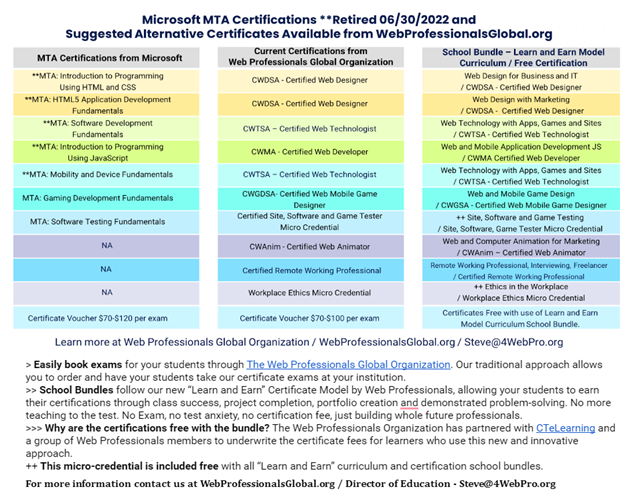 Click the above image to enlarge the Quick Reference Chart – Retired MTA Alignments
Click the above image to enlarge the Quick Reference Chart – Retired MTA Alignments
Our Approach
We have two paths to certification for schools and individuals. The first and traditional path is the proctored exam. Once a student is ready to get certified, they or their institution orders the exam, and then the student sits for the proctored exam. Most of the time the exam is taken at the institution where they are studying, or it may be taken at a designated site. Upon passing the exam, they are rewarded with their credentials. Cost for the exams ranges from $70-$100.
The second path is what we refer to as our industry-relevant certification model. In this model, we combine the interactive training with the certification. This allows the learner to earn their certification incrementally as they progress through the course. At the end of the course—based on their grades, completion of the projects, and building their career-ready portfolio—the learner is rewarded with their certification without needing to sit for an exam.
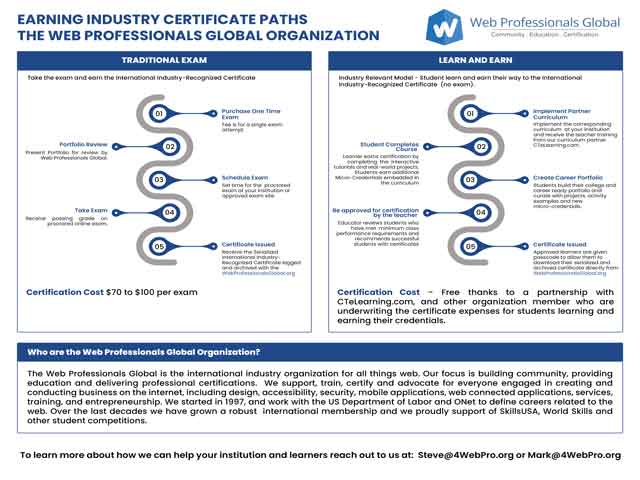 Click the above image to enlarge the Quick Reference Chart – Web Professionals Global Organization Paths to Certification
Click the above image to enlarge the Quick Reference Chart – Web Professionals Global Organization Paths to Certification
How Did We Do This?
We partnered with curriculum provider CTeLearning to supply schools with engaging STEM curriculum and certification bundles. The certifications we offer are more valuable than those offered by testing companies, as they measure knowledge and demonstration of skills—they do not gauge how well the student can memorize a list of questions.
Our embedded model has students earn their certifications as they work through the courseware and complete real-world technical projects. This approach removes test anxiety and results in certification recipients who know what it is like to build real projects and have a deep technical understanding of the technology.
Our certifications are not about any company’s software. They are about what a learner needs to be successful in the tech industry. This means schools do not have to worry about what software tools they are using, as the tools are all included with the curriculum for free. This allows course facilitators to focus on supporting students as well as focusing on creativity, problem solving and projects—not worrying about a software version. In industry, software is simply a tool. Tools are constantly changing, but design, development and creative problem solving are core to individual success. Our certs are about preparing students to be the “whole professional”—not someone who just knows how a piece of software operates.
Our curriculum bundle options can be a big money saver for schools and institutions. Thanks to a partnership between the Web Professionals Organization, CTeLearning and additional Web Professionals Organization members, the cost of the certifications are being underwritten for your students. This means that programs get the course and certifications for less than they paid for the Microsoft test vouchers alone.
Connect With Us Today
We are a community of professionals helping to drive the future of community, education and certification for web careers. Our certifications recipients and members span the U.S. as well as countries around the world in Africa, Europe, the Middle East and more. If you are a student or representative of a school who is seeking a certification program to replace your Microsoft program, we would love to talk with you. Our certifications can be deployed for your students immediately to keep them engaged and achieving.
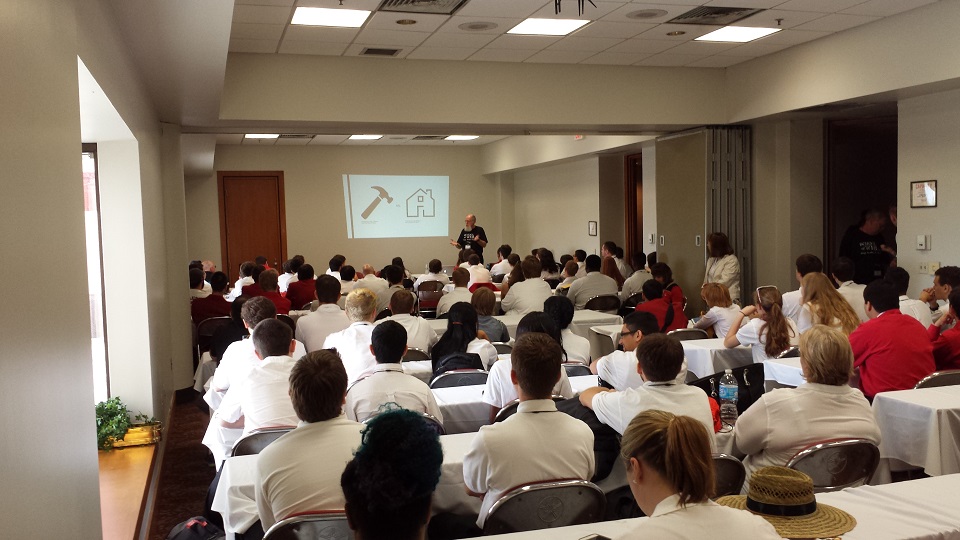
by Steve Waddell | Apr 29, 2022 | Web Pro News
Mark DuBois, Executive Director of the Web Professionals Organization, shares his reflections on the 25th anniversary of the organization. Mark was asked to take over the organization in April 2016 and has been running it ever since as Executive Director.
I
The Web Professionals Organization was originally founded as the World Organization of Webmasters (WOW), which was established in April of 1997. The founding Executive Director, Bill Cullifer, was a webmaster who was early to the scene of web design. Bill saw a need for the burgeoning wave of webmasters, content creators, and new internet businesses to come together in a community to share, collaborate and propel the web profession forward. Bill pitched his idea to many companies, and three of the largest gave WOW their start-up grants. We are still thankful to Adobe, Microsoft and Macromedia for our initial funding. The organization was registered as a 501(c)(6) organization, and the early years were full of growth. Bill Cullifer was deeply involved in growing the organization as Executive Director until 2015. He bowed out due to illness, but his legacy lives on.
The mid-1990s was kind of the wild wild west of the web, if you will. In 1992 I built my first web page, which no longer exists. I first came across the World Organization of Webmasters in 2001 in Chicago. I had been working in web technologies for a while at that point and created many websites including one for a multibillion-dollar utility company in 1995. Four years later, I felt a need to do more. It was then that I decided to give something back to the community. Like so many others who feel the call, I decided to teach the next generation. So in 1999 I started teaching at the local community college, and met some folks from the World Organization of Webmasters at a conference a few years later.
Coming from industry, I liked what the organization was doing. I began to seek ways to get more involved, so I took some certification exams and established a local chapter at the community college I taught at. I guess I made a name for myself and my program because a few years later, in 2006, I was offered and accepted the role of Director of Education for the organization. Remember that this was still early in the industry—I became an officer of the association the same year Steve Jobs announced the iPhone.
Under Bill’s leadership in the early years, we participated in many meetings of the World Wide Web Consortium (WC3) at various venues around the world from Edinburgh through Beijing. It was at these meetings that we gave presentations and had the opportunity to meet with a number of luminaries such as Sir Tim Berners-Lee, known as the inventor of the world wide web. These events were key in expanding the reach and influence of the organization—especially internationally.
Around 2006, I took my students to a web design competition in Springfield, Illinois that was held under the auspices of SkillsUSA. That was a state competition, as there was no national web design competition. I felt that the competition was not run as well as it could have been, opened my mouth, and the conference organizers invited our organization to run it ourselves. So that’s what we did. In 2002, we had a much-improved web design and development competition, where students actually had to compete at the state level. The Illinois SkillsUSA chapter loved what we had done, which got the National SkillsUSA executive team to take notice of our organization.
In 2004, the organization collaborated on our first national demonstration competition for web design and development. And we had a number of teams that competed in that initial competition— it was something like 12 or 15 teams of secondary schools that competed. At this point it was no longer a demonstration contest—it was official. And we’ve been doing the national web competitions for SkillsUSA ever since. I was responsible for competitions through 2008, when I passed it to a former student of mine named Jonathan. He has been doing it ever since for the state of Illinois. We have never missed a year and even continued to run the competitions, albeit virtually, through the COVID-19 pandemic. We are committed to giving students access to competitions run by industry professionals.
As an organization, we decided early on to get involved in web competitions to highlight industry best practices. Our experience with all the workshops, teacher training, and seeing what student competitors produced showed us that many schools don’t teach the business fundamentals that are so important in addition to technical skills. Because of this, we decided that the best way to drive professional standards is to have students compete at both the state and national levels. In our competitions, the students’ code has to adhere to international web development standards for them to have a chance to win.
Prior to the national competitions, all competitors participate in mandatory training so they are exposed to new concepts. We enjoy seeing the competitors discover that they don’t know as much as they think. This has helped us drive our message of professionalism and expand our influence as the competitor-students go back to their schools and encourage their teachers to teach industry best practices. We know this works as more teachers ask us about industry standards every year. Little by little we are helping secondary schools prepare future professionals, which is a big part of our mission.
II
In 2009, we were invited to be a part of the Web Standards Project, which unfortunately has been archived and is no longer active. We were thrilled to participate, as web accessibility and security has always been a focus of the organization. That year the meeting was held in Chattanooga, Tennessee with a number of people who were responsible for web standards. As you may remember, back then there were a number of different browsers emerging like Internet Explorer and Netscape. In the early 2000s, each browser came up with their own browser codes— there was the blink tag from Netscape, the marquee tag from Internet Explorer, and so forth. And the Web Standards Project was created to establish that all browsers implement similar code so that web designers could create websites that would work on any browser. This was something I felt strongly about, and I was delighted when I was chosen to be co-chair of the Education Task Force for the Web Standards Project.
Working with Adobe and a number of other companies, we established the criteria for what curriculum should contain. And this became the career cluster for things like digital media that are out there today. If you look it up, you’ll find there’s a digital media career cluster. This provided the impetus for us to work with the Department of Labor around 2011. We also worked with professors and universities around the U.S., including John Gunderson of the University of Illinois, to do seminars and events about web accessibility. We also worked with the WordPress team on their accessibility task force.
One of the biggest pushes for the Web Professionals Organization has been certifications. As we are made up of industry professionals, we had plenty of contacts to help us develop what would become our international industry-recognized certifications. With the blessing of our whole certification team we started to issue industry credentials in 2001. Back then, everything was paper-based. When I later became Director of Education, one of the first things I did was eliminate paper and make it all online. We thought this was a big step forward to modernize the organization and make it easier for more people to earn certifications. From 2006-2008, we had meetings in Las Vegas, with people representing businesses, workforce, secondary and post-secondary schools to define what should be taught in the way of curriculum as a general outline, and what should be covered in terms of certifications, technical skills, soft skills, and more.
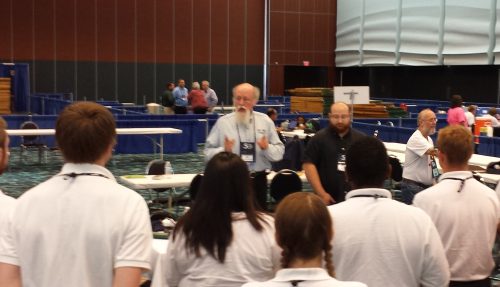
As a professional organization, we take credentialing seriously. The first certifications we offered were designer, developer, and webmaster. Today, we are proud to offer far more. What constitutes a web professional is far more diverse and demanding than back then. We do not teach to the test—you cannot find a sample test out there that you can practice with. For our professional levels, we ask to see examples of his or her work. For secondary and post-secondary students, we asked the teacher to assemble a portfolio of their work. To us, certifications signal that someone has the ability to produce and pull their weight in the industry—it does not mean that they are capable of cramming for an exam.
As an aside, I have been in the industry and education for decades. I have seen it all and understand what does and does not help the web profession. Testing companies will give you samples of their exam, and often will sell you a book to use to prepare for the exam. These exams usually have little to no basis in industry standards. We are proud to have higher standards than just scoring well on an exam that you can study for from a book. We are not so much about the number of professionals we welcome into our organization, but the quality of those professionals.
We have continued to make our certifications good for two years. Some have asked why they are not good for longer. It is for the simple reason that the world of the web changes so often that we must always be learning new skills. We are always focusing on the fundamentals. Frameworks come and go—we could make a list of those that have come and gone in just the last couple years. All that said, we focus on giving people a professional foundation that allows them to continue growing and adapting. We are about building true professionals.
A quick story: there was a high school that had a number of students earn apprentice-level certifications, and they did well. That teacher retired and they were replaced by somebody from a different department. The following year, 100% of their students took the exam. All 30 students failed miserably. The teacher called me and was apologetic. And we discovered in a very short order that the teacher was not teaching what the students needed to know. The teacher had just grabbed a book and focused on just coding and nothing else. However, the next year they turned it around by focusing on the appropriate things in the following year, and the majority of students passed the certification exam. Educators seek to develop whole learners, and we want to grow whole professionals. Our expectation is that the certification represents the fact that students have the knowledge and portfolio to demonstrate proficiency.
III
In-person meetings have also been important for us. We haven’t been doing as many in recent years because of COVID-19, but fortunately we understand how to use the internet to stay connected. Our members are webmasters, developers, and technologists from schools and companies of all sizes all over the world. Just as the internet is international, so is our organization. We work with schools and professionals in the Middle East, Africa, Europe, South America, and Asia. In addition to helping schools, we also help workforce partners train and re-engage adults in high-demand web careers. We are constantly working with industry and education partners to understand how we can better serve the web professional community, and it’s why we are industry-driven and industry-recognized.
Around 2010, we started the School of Web. We included a lot of the course materials that I had put together at the community college level, as well as courses from professors at other schools. We started the School of Web because in conversations with industry people we realized there was a hunger to develop their skills and knowledge. This started our efforts to offer micro-credentials.
One of the main drivers behind all of this, which is still somewhat true today, is that the term “web developer” can have different meanings. If you look at two job listings for a web developer, one may be looking for someone with HTML and CSS while the other may be looking for someone with a solid knowledge of a number of JavaScript frameworks. So our certifications and micro-credentials establish a baseline that any web designer or developer should have in their skillset. A big part of why the web technologies industry evolves so much is that there isn’t a set of standards for credentialing like different states have for medicine or law. And we’re seeing some improvements on that. Today, we are proud to have certification recipients and members not only all over the U.S. but also around the world in countries like Albania, Germany, Nigeria and Lithuania.
This year, we have begun to expand to doing more state competitions within SkillsUSA. We have seen early success so far. We’re trying to bring the state competitions to a new level of excellence, so that those who participate are better prepared before arriving at the national competition. For the national competition, each state can enter just one team at the secondary level and one team at the post-secondary level. By getting involved with these state competitions, we are now impacting many schools around the country.
We continue to go out of our way to build community and get people involved—everything from Slack channels to local chapters that meet. We strive to make sure our members have a solid understanding not only of web technologies but also best business best practices. We also have expanded our international presence— we have participated in the international WorldSkills competition, starting in 2013 in Leipzig, and we have had international members on our advisory board. Our mantra continues to be “Community, Education, Certification.”
It has been a wonderful 25 years for the Web Professionals Organization. When we started out, the web was in its infant stages. Today, the internet is more integral than ever to people around the globe in industries ranging from manufacturing to education and healthcare to energy. People work, learn, and play on the internet every day, making our mission more relevant and important than ever.
Stay tuned for a future article on where the Web Professionals Organization would like to go in the next 25 years. And if you would like to get connected, please contact us today. We are always seeking to expand our ranks both nationwide and worldwide and look forward to connecting with you.









